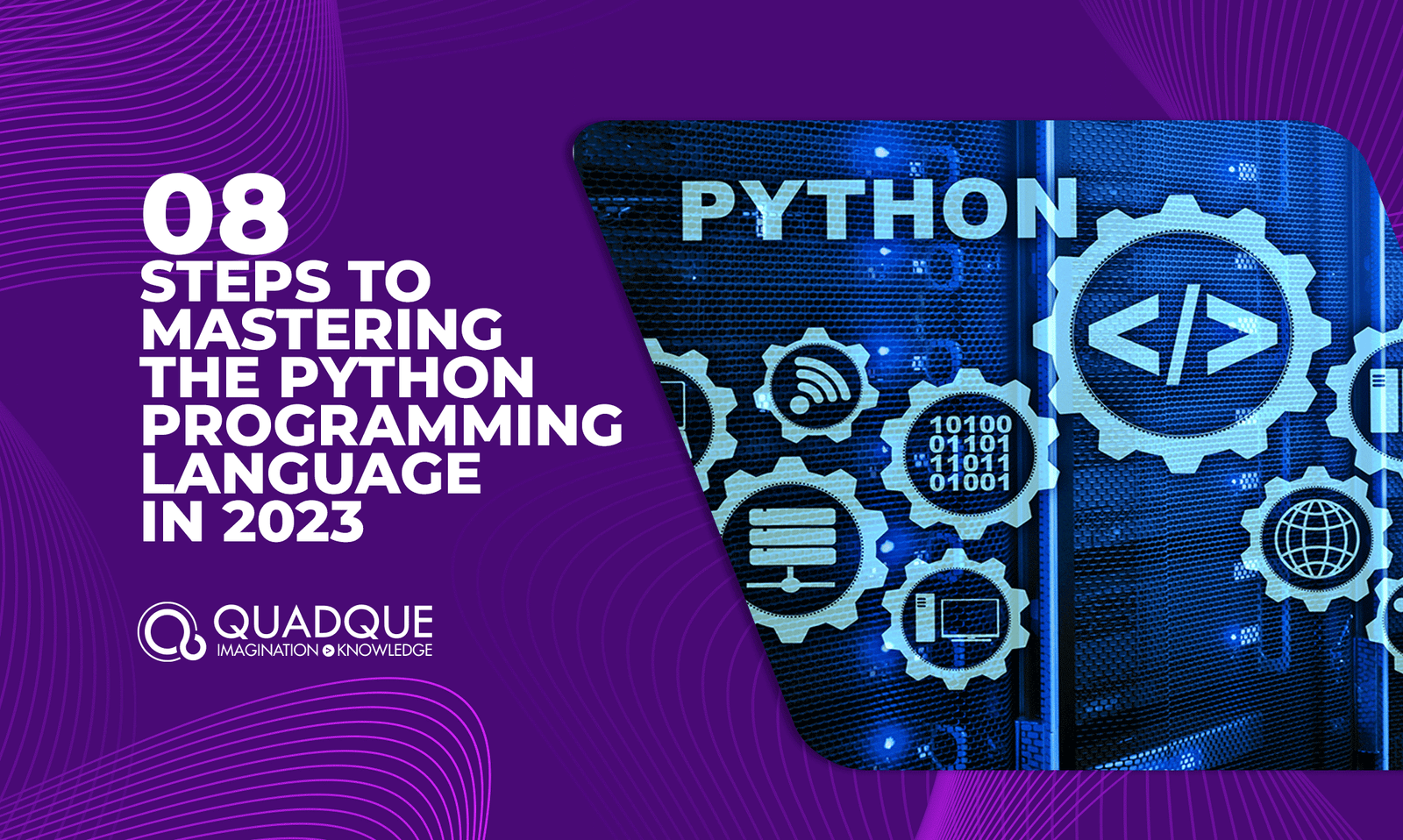
Step-by-step the Python Programming Language in 2023
Python is one of the most popular programming languages in the modern world. This versatile language has become a favorite tool used by programmers and developers worldwide. Learning a programming language does take time and patience. Let’s take a look at the eight steps to mastering Python that will speed up the overall learning process.
The Python Programming Language
Python is a high-level, interpreted programming language that is widely used for a variety of purposes, such as web development, scientific computing, data analysis, artificial intelligence, and machine learning. Python is known for its simplicity, readability, and ease of use. It has a clear and concise syntax. The simple syntax makes it easy to learn and understand. It also has a vast standard library that provides a wide range of modules and functions. This library can be used for various programming tasks. Python is an object-oriented language that supports multiple programming paradigms. The language has various capabilities, such as procedural, functional, and object-oriented programming. It also has a large and active community of developers who contribute to its development and maintenance. The rising popularity of Python has led to its widespread use in recent years. One of the most significant advantages of Python is its cross-platform compatibility. It can be used on a variety of operating systems, such as Windows, macOS, and Linux.
So it’s an excellent choice for developing software that can run on multiple platforms. Modern developers should have a good understanding of this amazing platform.
8 Steps to Mastering the Python Programming Language
Mastering Python does not have to be a complicated process. You can learn it quickly and easily with a few tips and the right mindset. Let’s talk about the eight steps to mastering the Python programming language. We will explain each step briefly in simple terms. So let’s take a look!
1. Start with the Basics
The first important step should be to learn the fundamental concepts of programming, such as variables, data types, loops and control structures. Without a solid knowledge of these basics, it’s not possible to move on to more advanced topics. So we highly suggest polishing your basics first.
2. Practice Writing Code
The more you practice writing code, the more comfortable you will become with the syntax and structure of the language. Regular practice will reveal your weaknesses and you will find areas where you can improve. As a developer, practicing writing code should be a regular habit that you develop over time.
3. Learn the Standard Library
Python has a large standard library that provides a wide range of modules and functions for various tasks such as file I/O, data processing, and networking. It’s a wise idea to check out this extensive library. The existing modules and functions can make your work much easier and faster.
4. Learn a Few Popular Libraries
You can also take a look at the most popular Python libraries out there. There are a number of these additional libraries that you will find in various sources. Learn a few popular libraries such as NumPy and Pandas for data manipulation and analysis and Matplotlib for data visualization.
5. Read and Learn from Other People’s Code
Reading and understanding other people’s code can be an excellent way to learn how to write your code. Always remember that an experienced developer can teach you a lot about coding efficiency and tricks. These extra tips and hacks can play a huge role in learning Python quickly.
6. Participate in Online Communities
Join online communities such as the Python forums and Stack Overflow to get help and share knowledge with other programmers. This is an important step because you need to learn more about the best practices for coding in Python. Every once in a while, new trends and updates appear. So you should stay up-to-date with these changes.
7. Keep Learning
Python is a constantly evolving language. New libraries, updates, frameworks and tools are being developed all the time. So don’t forget to keep learning and experimenting to improve your skills. Never be scared of experiments. You can learn many new things from trial and error in a project.
8. Enroll in Online Courses on Python
There are several websites, such as CodeCademy, Udemy and Coursera that offer informative courses on Python and other programming languages. We highly recommend these websites for getting additional resources for learning Python. Make sure that you choose a course that has good reviews from former students.
Conclusion
Remember that every Python course will be different and unique in its structure and lessons. Once you choose a course, you should stick with it and have some patience during the learning process. The whole journey will be a lot easier if you incorporate some of the tips mentioned in this article. It is important to first understand the basic concepts of programming before diving into a specific language like Python. Concepts such as variables, data types, loops, and control structures form the building blocks of any programming language and it is important to understand them well. Also, practice is the key to mastering any skill. We hope that you found this article on Python useful. It’s a wonderful programming language that can be used for a wide range of purposes. If you’re a programmer or developer, you should check out this language to diversify your skills. Don’t hesitate to contact us if you have any questions regarding programming languages.
Recent Posts
- Sustainable Graphic Design for 2024 and Beyond
- Profit Power: Maximizing Revenue Growth with CRM Software
- Medical and Elderly Care in the UK: Strategies for Sustainable Growth
- Securing Educational Excellence: IT Support for the Digital Era
- Tech Transformation: The Untold Story of Bangladesh’s Innovation Hub
Recent Comments
Latest Post
Categories
- AI
- Biometric
- Blockchain
- Cloud Computing
- CRM
- custom software
- Cybersecurity
- Data Analysis
- Datacenter Management
- Designer
- Digital Marketing
- Education
- health care
- Informative
- ISP Management
- IT Procurement
- IT Recruitment
- IT Support
- Mobile App
- Network Management
- Robotics Landscape
- SAP ERP
- SEO
- Structured Cabling
- Tech Australia
- Tech bangladesh
- Technology
- tourism
- Uncategorized
- Web Development


